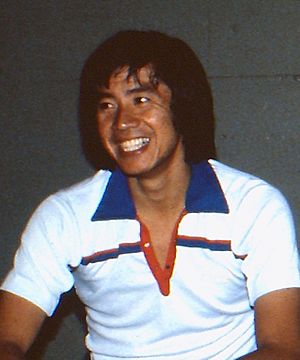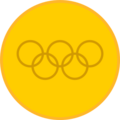Rudy Hartono facts for kids
Quick facts for kids Rudy Hartono Kurniawan |
|||||||||||||||||||||||||||||||||||||||||||||||||||||
|---|---|---|---|---|---|---|---|---|---|---|---|---|---|---|---|---|---|---|---|---|---|---|---|---|---|---|---|---|---|---|---|---|---|---|---|---|---|---|---|---|---|---|---|---|---|---|---|---|---|---|---|---|---|

Hartono in 1980
|
|||||||||||||||||||||||||||||||||||||||||||||||||||||
| Personal information | |||||||||||||||||||||||||||||||||||||||||||||||||||||
| Birth name | Nio Hap Liang 梁海量 |
||||||||||||||||||||||||||||||||||||||||||||||||||||
| Born | 18 August 1949 Surabaya, East Java, Indonesia |
||||||||||||||||||||||||||||||||||||||||||||||||||||
| Height | 1.82 m (5 ft 12 in) | ||||||||||||||||||||||||||||||||||||||||||||||||||||
| Country | Indonesia | ||||||||||||||||||||||||||||||||||||||||||||||||||||
| Handedness | Right | ||||||||||||||||||||||||||||||||||||||||||||||||||||
| Men's singles Men's doubles Mixed doubles |
|||||||||||||||||||||||||||||||||||||||||||||||||||||
|
Medal record
|
|||||||||||||||||||||||||||||||||||||||||||||||||||||
Rudy Hartono Kurniawan (born Nio Hap Liang; 18 August 1949) is a famous Indonesian former badminton player. He holds an amazing record. He won the men's singles title at the All-England Championship eight times. Seven of these wins were in a row, from 1968 to 1974.
He also won the World Championship in 1980. This was the only time he tried for that title. Many people think he is one of the greatest badminton players ever. He is truly a badminton legend.
Contents
Early Life and Training
Rudy Hartono was born on August 18, 1949, in Surabaya, Indonesia. His birth name was Nio Hap Liang. He was the third of eight children in his family. His father, Zulkarnain Kurniawan, owned tailoring and dairy businesses. Rudy's sister, Utami Dewi, also became a great badminton player. She won the Indonesian national championship five times.
Young Rudy loved many sports. He tried athletics, swimming, volleyball, football, and roller skating. But he soon found his true passion in badminton.
At age 11, Rudy began serious badminton training. His father taught him in a small club. This club was set up in a railway station warehouse. In 1961, at age 12, he played in his first tournament. He won the Surabaya junior championship. Later, he joined the bigger Rajawali Club. Many top Indonesian players trained there. By age 15, he was the national junior champion. National scouts noticed his talent. In late 1965, he joined the national training center. He was asked to help the national team for the upcoming Thomas Cup.
Amazing Badminton Career
Rudy Hartono joined the 1967 Thomas Cup team. He won all his matches. However, Indonesia lost to Malaysia. The final match was stopped because of a rowdy crowd. Indonesia later chose not to finish the match. This meant Malaysia won the cup.
A year later, at just 18, Rudy played in his first All England Championships. He became the youngest champion ever. He beat Tan Aik Huang from Malaysia. Tan had won the title two years before. After this, Rudy dominated the All England event. He won seven titles in a row from 1968 to 1974.
In 1975, Rudy tried for his eighth straight title. He wanted to break Erland Kops’s record of seven wins. He faced his rival, Svend Pri, whom he had beaten before. But this time, Rudy lost the match. However, he came back the next year. In 1976, he won his eighth title. He beat his fellow Indonesian player, Liem Swie King. This made him the most successful men's singles player in the tournament's history. His eight All England titles earned him a spot in the Guinness Book of Records.
Rudy tried for a ninth title in 1978. But he lost to Liem Swie King in the final. He attempted another comeback in 1981. He reached the semi-finals but lost to Prakash Padukone.
Other Major Wins
Besides his All England success, Rudy won many other international titles. In 1969, he won the Canadian and US Open titles. He also won the Singapore Open men's singles and doubles titles that year. In 1971, he won his second Canadian Open title. He also won his first Denmark Open title. That same year, he won three titles at the Western Indian Championship. He won men's singles, men's doubles, and mixed doubles. He won the Denmark Open again in 1973 and 1975. In 1981, he won his first Japan Open title.
Rudy also did well in major games. At the 1970 Asian Games in Bangkok, he won a gold medal with the men's team. He also won two bronze medals in men's doubles and mixed doubles. In 1971, he won another gold at the Asian Championships. Indonesia's men's team beat Malaysia in the final.
Badminton was a demonstration sport at the 1972 Munich Games. Rudy won the men’s singles event there. He beat Jamie Paulson, Sture Johnsson, and Svend Pri to win. In 1980, Rudy played in the 1980 IBF World Championships in Jakarta. He reached the final and beat Liem Swie King. This gave him an official world championship title.
Thomas Cup Success
Rudy Hartono played for Indonesia in the Thomas Cup from 1967 to 1982. He helped his country win four straight Thomas Cup titles. These wins were in 1970, 1973, 1976, and 1979.
In the 1982 Thomas Cup Finals, Rudy played again for his country. He was older, and his play was not as strong as before. Indonesia lost to China, who won their first Thomas Cup title. Rudy lost his match to Luan Jin. This was only his second loss in the Thomas Cup. After this competition, Rudy Hartono announced his retirement. He said he had to retire, but he played because his country needed him.
Life After Retirement
After retiring from playing, Rudy Hartono stayed involved in badminton. He worked with the Badminton Association of Indonesia (PBSI). He held roles like Chairman of Development Affairs until 2006. He is now a member of PBSI’s Board of Honour.
Rudy also played a part in the Badminton World Federation (BWF). He was a member of their Council from 1985-1986, and again from 1994 to 2009. Because of his good image, the United Nations Development Programme (UNDP) made him a Goodwill Ambassador for Indonesia.
Rudy studied economics at Trisakti University in Jakarta. After retiring, he started new businesses. He went into the dairy business in Sukabumi. He also worked in sports equipment. He was an agent for brands like Mikasa, Ascot, and Yonex. Later, through his company PT Havilah Citra Footwear, he imported sportswear.
Personal Life
Rudy Hartono married Jane Anwar in 1976. They have two children, a son named Christopher and a daughter named Christine.
Rudy became very active with his church ministry starting in 1989. In 2001, he became an associate pastor at Bethel Church in Jakarta.
Rudy also loved movies. He even starred in an Indonesian film called "Matinja Seorang Bidadari" (Death of An Angel) in 1971. He also has a wax sculpture of himself at the Madame Tussauds museum in Singapore.
Honours and Awards
- 1969 and 1974 – SIWO/PWI best athlete
- 1985 – IBF Distinguished Service Award
- 1986 – IBF Herbert Scheele Trophy
- 1987 – Honorary Diploma from the International Fair Play Committee (CIFP)
- 1988 – Fair Play Award from the United Nations Educational, Scientific and Cultural Organisation (UNESCO)
- 1997 – IBF Hall of Fame
- 2000 – Republic of Indonesia's Honorary Sign for Bintang Mahaputera Utama
- 2006 – Asian Heroes, TIME Magazine
Images for kids
See also
 In Spanish: Rudy Hartono para niños
In Spanish: Rudy Hartono para niños
 | Madam C. J. Walker |
 | Janet Emerson Bashen |
 | Annie Turnbo Malone |
 | Maggie L. Walker |




